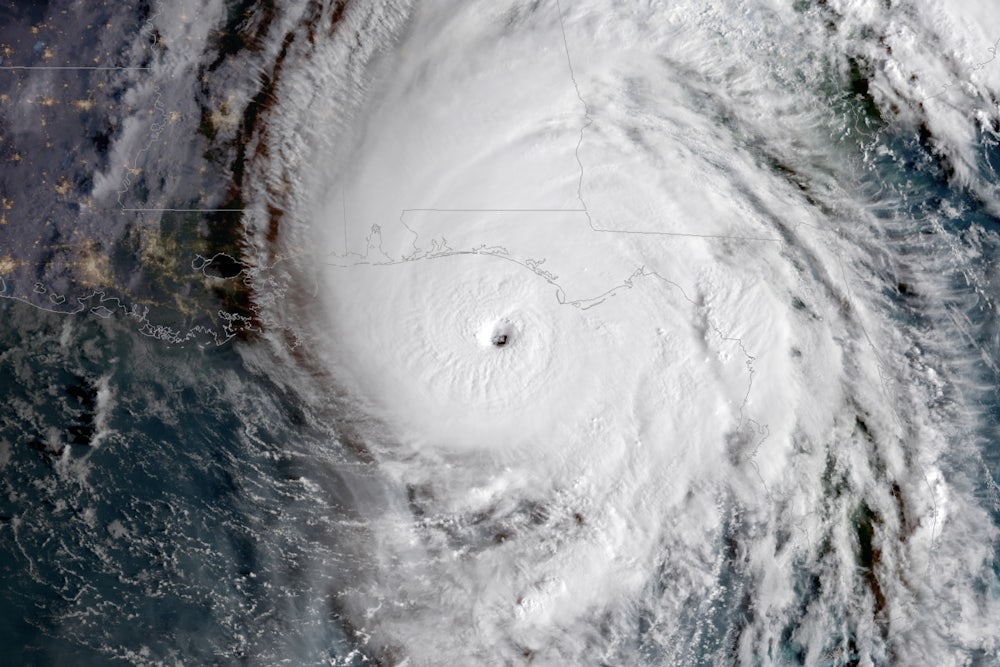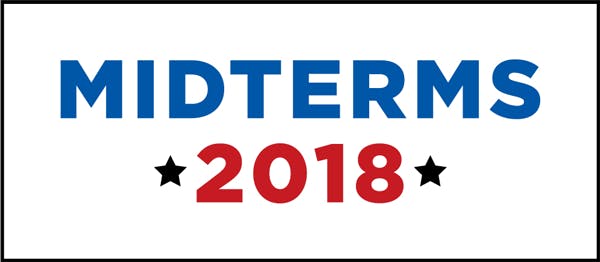Hurricane Michael made landfall on Wednesday with winds of 155 miles per hour, just shy of Category 5 strength—the most powerful hurricane to hit Florida’s panhandle in recorded history. It will also serve as an “October surprise” in the upcoming midterm elections in Florida, where the state’s Republican governor, Rick Scott, is in a tight race for U.S. Senate against Democratic incumbent Bill Nelson.
Politically, the hurricane stands to benefit Scott far more than Nelson. As a sitting governor, Scott can more easily show leadership during a crisis, which voters are proven to reward. He’s been doing just that: The New York Times reported on Monday that Scott “has been darting from one county emergency operations center to the next for closed-door meetings and somber news conferences.” It’s a familiar and perhaps comforting sight for Floridians, as Scott has presided over three hurricanes and six tropical storms during his tenure. This week, Scott declared a state of emergency for 35 counties; activated 1,250 members of the Florida National Guard; and waived tolls to allow coastal residents to evacuate more quickly.
Nelson has less opportunity to show such leadership. As a sitting U.S. senator, he was empowered to ask President Donald Trump to declare a federal emergency in Florida—but other lawmakers did so, too. Nelson also can’t stage elaborate press conferences that compare with Scott’s. The Times reported that Nelson “tried to speak to reporters at the emergency management center in Tallahassee—the same place where Mr. Scott often commands the state’s attention—but was turned away because he was not there for official business.”
If Nelson has one advantage, though, it’s that he’s been trying to prepare Florida for big storms like Michael for years, by drawing attention to the impacts of climate change and calling for action. He’s proposed legislation to help coastal cities prepare for greater storm surge; held hearings on sea-level-rise; and advocated for strengthening building codes to withstand wind events. His opponent, on the other hand, “has done little over the years to prepare for what scientists say are the inevitable effects of climate change that will wreak havoc in the years to come,” according to The Washington Post. And Scott’s failure to prepare has had grave implications for Florida, “one of the states at greatest risk from rising sea levels, extreme weather events—including more-powerful hurricanes—and other consequences of a warming planet.”
In the past, Nelson has called out Scott for ignoring global warming. But the senator hasn’t been talking about climate change this week, amid Hurricane Michael, as Floridians on the Gulf Coast feel the consequences of Scott’s inaction. Why? Because doing so would invite accusations of politicizing a tragedy.
Both Nelson and Scott have sworn off campaigning during the storm, cancelling events and taken down negative ads. “This is not the time for politics,” Nelson told CNN on Tuesday.
This mutual agreement benefits Scott more than Nelson. The governor, dressed in “disaster casual,” can still engage in politics by repeatedly appearing on the television screens of millions of people, talking about how the state is going to weather the storm. At the same time, Nelson effectively has muzzled himself from showing how decisions Scott has made have worsened Michael’s impacts—at a time when that argument is most relevant to people in the state. The no-politics pact also insults voters, implying they’re unable to consider policy implications at the same time they’re digesting emergency information about a hurricane.
Nelson is far from the only Democrat avoiding climate change at a critical time for voters—and far from the worst offender, since he’s at least talked about the issue during his campaign. As the Times reported last week, “The vast majority of Democrats and Republicans running for federal office do not mention the threat of global warming in digital or TV ads, in their campaign literature or on social media.” Those candidates include Democrats running in districts hit hard by hurricanes Florence, Harvey, and Maria—three disasters that scientists have said were made worse by global warming.
Climate change is indeed a politically risky topic, owing to years of Republican claims that it’s not an existential threat to the planet, but a liberal conspiracy to regulate big industries out of business. Democrats in swing or conservative-leaning districts are understandably shy about calling Republicans liars, so instead they ignore the issue. It’s simply not worth taking the risk—especially on a topic that historically hasn’t even motivated liberal voters.
But historical motivations for voting are becoming less instructive as climate change worsens. Over the last year, millions of Americans experienced record-breaking extreme weather—500-year floods, devastating wildfires, powerful hurricanes. And because of the rise of attribution science, scientists have been able to quickly attribute details of these weather events to climate change. For most Americans, climate change has always been something that might happen in the future, but hasn’t happened yet. That reality is changing.
Democratic candidates who represent Americans affected by these historic weather events have a unique opportunity to adapt to this new reality, and highlight the consequences of climate denial on voters’ lives. Republicans might call them insensitive. But voters deserve lawmakers who would rather protect them from disasters than protect them from the truth.

